

The 101 Most Useful Websites on the Internet. Here are the most useful websites on the Internet that will make you smarter, increase productivity and help you learn new skills. These incredibly useful websites solve at least one problem really well. And they all have cool URLs that are easy to memorize thus saving you a trip to Google. Also see: The Best Android Apps.
Famous Quotes, Quotations and Proverbs in Proverbia.net. Safe and simple blogs for your students. WRITING. Educational Technology and Mobile Learning: 10 Awesome iPad Writing Apps. 3 Ways to Create Compelling Digital Content. By Sue Painter You know how some things can be both a blessing and a curse?

Our ability to create and publish digital content is one of those things. The blessing is that you have the ultimate control over how your content is created and marketed. The curse is that since anyone can do it, a lot of people do – and it’s increasingly difficult to make your content stand out from the ever-growing crowd. Chris Betcher on Blogging and “Publicness” Chris Betcher on Blogging and “Publicness” Posted on December 19th, 2011 | 4 Comments and 24 Reactions Chris Betcher Have you “Googled” yourself lately?
You might not actively participate on the Internet. You may be aware of the idea of a ‘digital citizen’ but don’t feel like that’s you. These sentiments will either have you nodding in agreement or raising an eyebrow in surprise The truth is, however, that there are still many educators out there who feel that way about the Internet and its use. 10 tips for (reticent) bloggers… A colleague who teaches writing, draws incredible poetry and prose out of her students.
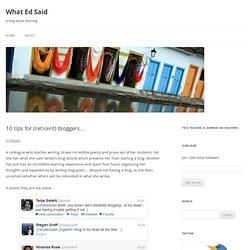
Yet she has what she calls ‘writer’s blog’ (block) which prevents her from starting a blog. Another has just had an incredible learning experience and spent four hours organizing her thoughts and experiences by writing blog posts… despite not having a blog, as she feels uncertain whether others will be interested in what she writes. It seems they are not alone… When I started blogging, I struggled to find my voice. My first few posts (some of which were subsequently deleted) sounded as if they had each been written by a different person. 10 tips for reticent new struggling teacher student bloggers… Write in your own voice, as if you are talking to people you know.Don’t over-think and over-plan, just write what’s in your head.
9 unforgivable blogging offenses. Blogs provide an excellent platform to engage with customers.

WordPress blogs reach more than 70 million readers, and Tumblr blogs reach up to 39 million. With numbers like those, you can see how important a blog can be, both as an extension of a business site and as a stand-alone destination. But many bloggers make basic errors that lessen their blogs' effectiveness. Are you making the same errors? Review the following list of nine unforgivable blogging offenses to make sure you are not committing any of them. 1.
Problem: Your blog is a horrible dense block of text with no breaks, bullet points, headings or graphics. Organizing your blog posts into sections and including bullet points, subheadings, numbers, and graphics not only makes your post easier to construct, but also makes for a much easier and appealing read. Tips for Bloggers. I really like a recent blog post by Edna Sackson.
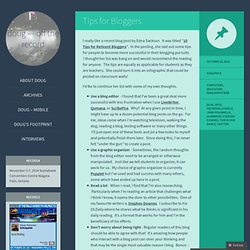
It was titled “10 Tips for Reticent Bloggers“. In the posting, she laid out some tips for people to become more successful in their blogging pursuits. I thought her list was bang on and would recommend the reading for anyone. The tips are equally as applicable for students as they are teachers. She could turn it into an infographic that could be posted on classroom walls! I’d lke to continue her list with some of my own thoughts. The 7 Habits of Highly Ineffective Bloggers. Free Social Teaching and Learning Network focused solely on education. 12 Tips to Manage Time and Increase Efficiency in the Classroom! 12 Tips to Manage Time and Increase Efficiency in the Classroom!
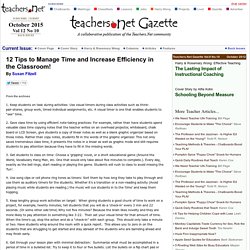
By Susan Fitzell closeAuthor: Susan Fitzell Name: Susan FitzellSite: About: Susan Fitzell is a nationally recognized speaker and author of several educational resource books. She has over two decades of experience with differentiated instruction, teaching youth with special needs, students with behavioral and anger management issues, and students who experience bullying. Susan’s company, AIMHI Educational Programs, focuses on building caring school communities. Authors Posts (45) From the archives 1. 2. 3. 4. 5. 6. 7. 100 High School Teacher Blogs To Start Reading. No matter what grade you teach, high school teacher blogs are some of the most important resources for teachers and school administrators. They feature insight, in-depth discussion, and usually quite a few bits of humor and personal experiences. What could be better? The following list courtesy of Online Degrees should get you more than started on finding some fascinating new educators to add to your RSS reader!
Confessions from the Couch - This history teacher and cheerleading coach uses her blog to discuss her thoughts and opinions on the state of education in America’s urban schools. Recommended posts: “Problems of Urban Education ” and “ Bellwork Success .” Failing Schools – This political blog is written by three different authors, all of whom have experience in teaching as well as opinions on educational reform. MathNotations – This blogger posts numerous math, algebra, geometry, and calculus problems that any middle or high school teacher could use in their classroom. Mr. Mr. On Blogging: Finding Peace With the Pit. I haven’t gone all meta on my blogging in a while… There’s never a dearth of people I meet who come to the idea of blogging and feel that pit in their stomachs.
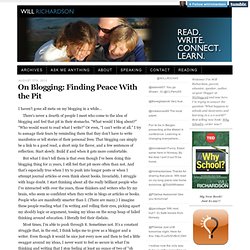
Top 100 technology blogs for teachers. 10 tips for (reticent) bloggers… Blog Basics - Basics for Blogging. August 28th, 2012.

Reflections On Being A Blogger. Last week on #edchat the discussion turned to blogging and the importance (or maybe not) in and out of the classroom.
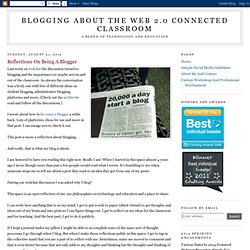
As always the conversation was a lively one with lots of different ideas on student blogging, administrator blogging, platforms and more. (Check out the archive to read and follow all the discussions.) I wrote about how to be come a blogger a while back. Lots of platforms, ideas for use and more in that post. I encourage you to check it out. This post is more a reflection about blogging. …and this is why teachers should have blogs. I have been a big advocate of blogging for teachers, but not until I started doing it myself.
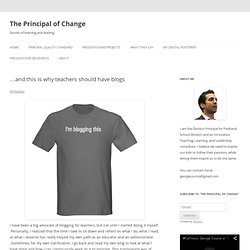
Personally, I realized that the time I take to sit down and reflect on what I do, what I read, or what I observe has really helped my own path as an educator and an administrator. Sometimes, for my own clarification, I go back and read my own blog to look at what I have done and how I can continuously work on it to improve. This transparent way of learning is something that I believe can not only improve the teaching profession as a whole (for example, take a look at the conversation on this Pernille Ripp post from today), but is something that could really improve learning for our students.
Blogs.